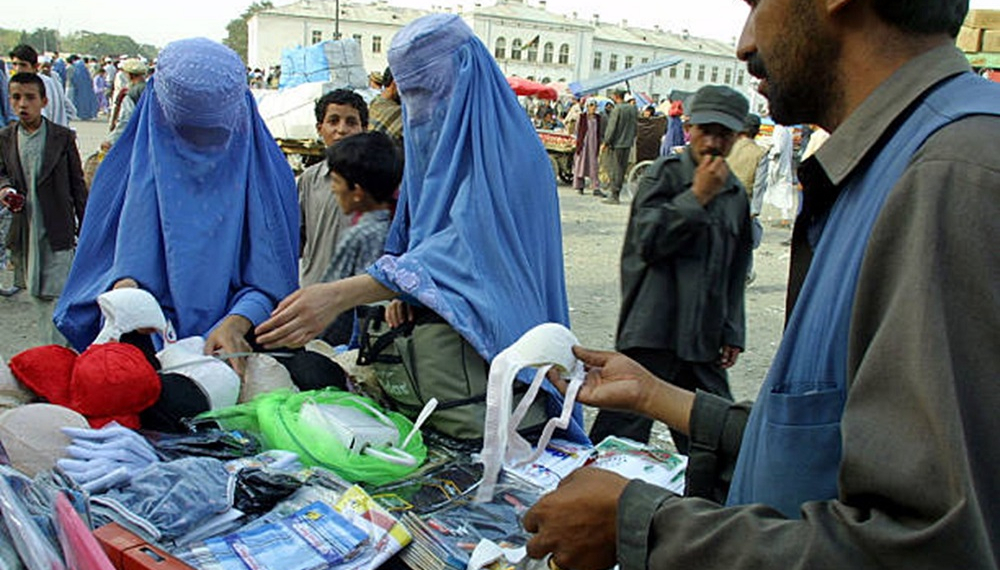By Elyas Ahmadi
Shamsia Abdullahi* used to own a shop selling women’s items in Ghazni city before the collapse of the previous government in 2021. She now spends her days housebound without an income.
Whether it was underwear, menstrual products, or cosmetics, women would come into her shop and they could also find out more information with ease.
“They came with peace of mind. They asked about the prices, expiration dates, how to use the product, and we told them all these,” Ms Abdullahi, 22, said. “If they needed bras, they could buy their desired size. If it was too big or small, they would return, and we would exchange it.”
Ms Abdullahi said that women no longer feel safe purchasing these items. “When we ask a little more from the male sellers about the quality of the material or the method of use, or anything, some of them respond abusively. That causes us harassment and shame.”
One of the busiest places in Ghazni city is the market in front of the cinema where paddlers are selling their wares. None of them are female, but at least 10 of them are selling women’s underwear. A teenager walking by with his friends brushes his hand across a padded woman’s bra. His friends burst into laughter.
After the Taliban regained power in August 2021, life for women became increasingly restricted with various decrees from the de facto authorities curtailing women’s freedom and rights.
When the Taliban took full control of Afghanistan in 2021, sweeping restrictions were placed on girls and women, banning them from school, university, and many sectors of employment. Gender segregation has been increasingly enforced in public spaces where families used to mingle, and morality police have cracked down on women’s appearance and dresscode in public.
No official ban was ever passed on women working in business, but women-run businesses in Ghazni have dwindled in the face of an increasing attitude of disrespect and harassment from police and other men.
The bustling Ghazni city center no longer has women-run shops, forcing women and girls to buy underwear, disposable pads for menstruation, and other essential items from male shopkeepers who harass them, according to a number of girls and women.
Ghazni is one of the more conservative provinces in Afghanistan. Even before the Taliban, it was considered taboo to openly discuss women’s underwear. But with the Taliban ideology being enforced, it seems such taboos have become more laden and a chance to publicly denigrate women.
“It’s so difficult that it makes me hate my femininity,” a resident of Ghazni city Shakiba, 21, told Rukhshana Media of her shopping experiences.
She said when she has to buy anything women-related, she no longer asks the shopkeeper for the item, but instead merely points at it.
“We can’t ask about the method of use and other details because Ghazni city is culturally such that when we ask male sellers for women’s items, they come up with things that make fun of it or talk about it very unpleasantly,” she said.
It has meant that Shakiba has purchased things by mistake. She said that she will usually only realised once she returns home and she can take the item out of the bag to inspect it.
“It’s like buying something blindfolded,” she said. “It happens a lot that when I get home that I realize I bought a different item or something. Like it is a low-quality one or the size is too big or small.”
Further complicating the experience, Shakiba said either male shopkeepers refuse to have it returned or exchanged or women are too ashamed to return and have the discussion.
“We will not go back again. We are ashamed,” she said. “Also, some sellers harass and tease us.”
Nilab, 19, shared a similar experience to Shakiba in her shopping in Ghazni city. “For example, if we say that the bra was too big, they will say that ‘hmm but your ones [breasts] are not even this much?’ Or if we say it was small, they will say sarcastically ‘Mashallah!”
Ghazni activist Zarghuna Mohammadi told Rukhshana Media that the city has become a city of men. She said these problems women are facing are not just the stories of one or two people.
Ms Mohammadi said she knows many girls and women facing these difficulties and choosing at times to go without items they need. “Those who can’t buy these things face many problems,” she said. “It even endangers their health.”
Note: Names have been changed at the interviewees request.








